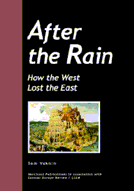A few of my colleagues in the international media compared the latest clashes between Albanians and Macedonians in Macedonia to the two Palestinian intifadas ("uprisings") in 1987 to 1993 and from September 2000 in Israel. In doing so, they demonstrated their ignorance of the two regions and the four peoples involved.
The Macedonians are a small nation. Their very nationhood is doubted by their Bulgarian neighbours (who regard them as rustic Bulgarians speaking a funny Bulgarian dialect). The Greeks—another neighbour and the biggest investors in the Macedonian economy—consider them to be Slav invaders. The Serbs are convinced that they are Serbs who occupy "South Serbia." Who needs enemies in the Balkan if one has neighbours?
The inevitable result is that Macedonians are very touchy when it comes to the territorial integrity of their tiny (25,000 sq km) country, to the official version of their history and to their language. The current Albanian troubles are perceived by them to threaten all three.
According to the last official census, ethnic Albanians constituted around 25 percent of the population. Add to this Albanian expatriates, a decade of fecundity and census-dodging, and 33 percent of the population would seem a safe bet. There are Albanians everywhere in Macedonia, but mostly in its western part which borders on Kosovo.
The Albanians in Macedonia are economically better off than their brethren in Albania and in Kosovo. But they are a minority and, inevitably, suffer some discrimination (especially in the job market and in education). Albanian women prefer not to work (due to traditional values, the size of the average Albanian family and other, objective, constraints). Even accounting for this fact, unemployment among the Albanian populace is higher than it is among the Macedonians. At 25 to 30 percent country-wide, the unemployment rate is anyhow explosive.
Distrusted
Unemployment and discrimination (mostly real, some of it imagined), especially among the well-educated, breeds resentment. Resentment in the Balkans breeds virulent nationalism and guns, not necessarily in this order. That ostensibly Macedonian Albanians insist on waving the flag of a neighbouring country (Albania) rather than their own on official occasions does not add to the already shaky mutual trust among the communities. That some of them (admittedly a negligible minority) entertain the dream of a Greater Albania (that includes western Macedonia) does nothing to assuage Macedonian fears.
Despite (or maybe because of) centuries of peaceful co-existence and good neighborly relations, Macedonians have a stereotype of Albanians as backward, steeped in crime and reflexively secessionist. Albanians, on the other hand, are very dramatic about what some of them insist on calling "state terror." Sporadic police brutality against Albanians does not help the Macedonian case.
Hence the perennial heated debate about whether Albanians should be allowed to use their language in their own higher education institutions. Macedonians regard these rather usual demands as the beginning of their end. They recall the tactics of the Albanians in Kosovo. First, prosaic and rather reasonable demands regarding human rights, health, jobs and education. Then, an armed uprising of paramilitary units, followed by Western pressure to "compromise" and grant the minority their "legitimate human and civil rights." Then NATO.
The Macedonians fully believe—official protestations aside—that the Albanians are simply trying to repeat the Kosovar success in other parts of Serbia (Preševo) and in Western Macedonia. Macedonians seem to believe in the reality of a Greater Albania vision more than most Albanians do.
Looking after the interests
But the uprising in Macedonia has little to do with a Greater Albania and a lot to do with greed and gripes. It is a confluence of frustrated idealism and hard cash. Those who do the fighting are an eclectic bunch of disgruntled former KLA toughs (under the itinerant name "National Liberation Army") and wide-eyed students. They are mostly Kosovars but with significant logistical support from the local population (underground hospitals, arms caches and such). Some of the fighters and many in the logistics are Albanian Macedonian citizens. The insurgency is as much about business as it is about rights.
The Albanians in Macedonia who do not belong to the Albanian party in power (the DPA) seem not to have shared the spoils and patronage that it doled out so wholeheartedly to its coterie and cronies. A third Albanian party has just been established, apparently to cater to their needs.
Many members of the theoretically disbanded KLA found themselves shovelling snow for a pittance or altogether unemployed. Even crime does not pay; it has been taken over by ruthless gangs from Albania proper. But it would be wrong to say that it's all about money. The ethnic Albanian population is genuinely disenchanted with the rule of the Macedonian majority. And this uprising is about airing their grievances as well.
There is no popular and widespread support for a full-scale armed rebellion among the Albanians anywhere. That would be too economically disruptive for both legal and illegal businesses. The leaders of Albania, Kosovo (with the notable exception of Rugova, who may be at great personal risk following the recent local elections he won) and of the Macedonian Albanians have all denounced the violence. But a limited "message" to the Macedonian authorities ("give us our rights peacefully, or else...") seems to enjoy a tacit—though unexpressed—consensus.
The irony is that the current government of Macedonia has gone out of its way to accommodate the demands of the Albanian population. An Albanian party (the aforementioned DPA) is one of the

|




 The author:
The author:
